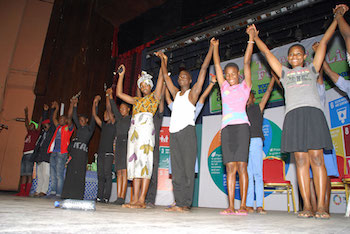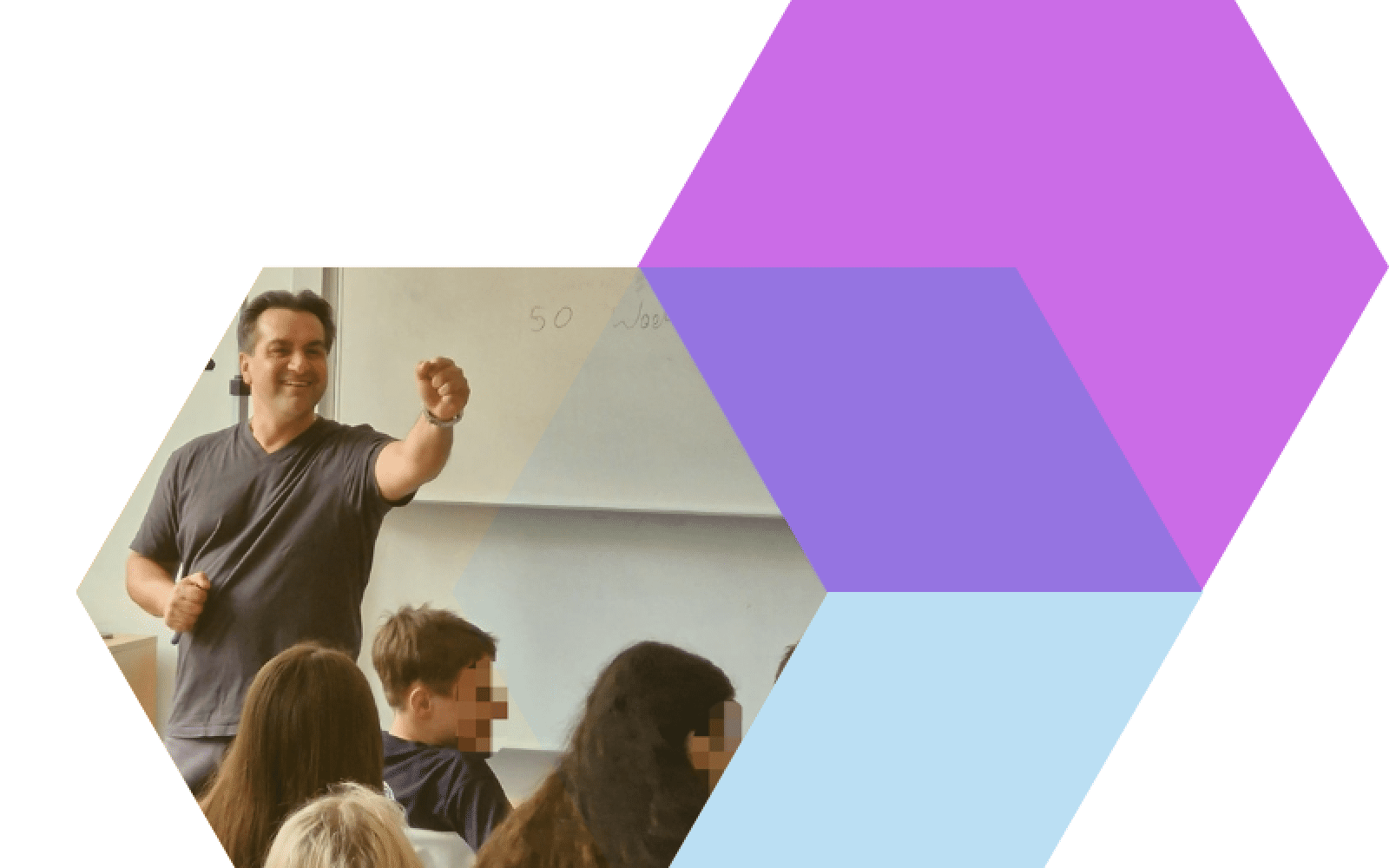By engaging adolescent peer educators, volunteer parent counselors, and teachers in a comprehensive program to provide information to adolescents about health and sexuality, Nike is enabling thousands of Nigerian teenagers to make informed decisions that will enhance their reproductive health and their dignity.
CASE STUDY: Shifting the Societal Approach to Sexual Health

Organizational Vision
Action Health Incorporated (AHI) has pioneered the movement to bring adolescent health issues to the eye of the public by creating access to sexuality education, counseling, and health care services to empower youth to make informed and responsible decisions. When Ashoka Fellow Nike Esiet founded AHI in 1989, very few programs existed to educate adolescents about health and sexuality despite an alarming rate of unsafe sexual activity among Nigerian youth. As a result, AHI initially confronted significant political resistance because the topic was so taboo in Nigerian society. For more than 17 years, the organization has designed and implemented innovative and participatory projects in education, established an infrastructure for the dissemination of information, and created channels for publicity and advocacy, designing models that have been adopted and expanded by government and other citizen sector organizations.
Today, the impact of AHI’s programs is evident; AHI’s influence has helped shift the nation from denial and apathy to action in placing adolescent sexuality issues at the forefront of the national education policy agenda. With the support of the Federal Ministry of Education and private foundations like the MacArthur Foundation, Ford Foundation and Packard Foundation AHI catalyzed the development of the National Sexuality Education Curriculum. This curriculum is now the Nigerian education sector’s main strategy in combating the HIV/AIDS epidemic among its teeming adolescent population. Building on success in Nigeria and the receptivity of the community, AHI aims to influence education policies in other African nations.
Citizen Base Strategy
Get the most mileage out of every institutional investment
“Partnerships are so important, especially when working on controversial issues.”According to Esiet, “the more people who believe in the issue you are advocating for, the more likely you are to succeed.” To raise public support for the initiative in its early stages, AHI in partnership with other organizations developed a consensus document called “Guideline for Comprehensive Sexuality Education in Nigeria”, and got over 100 national organizations to endorse this document in 1996. AHI’s efforts essentially broke the silence on youth sexual health, which eventually earned the support of the federal government. Now, sexuality education classes are a part of the formal education curriculum in at least 18 states of the 36 states in the Federal Republic of Nigeria. In Lagos State specifically, sexuality education has been taught in classrooms over the last three years, and the Lagos State Government has consistently budgeted for the sexuality education curriculum’s implementation. AHI has conducted Family Life and HIV/AIDS Education (FLHE) Teacher Training since 2003 and has provided training and reference materials to facilitate implementation of the curriculum in schools. In over 300 public schools in Lagos State, 90% of the 1550 teachers employed to teach the FLHE curriculum have been trained through AHI’s program. AHI’s government partners make valuable in-kind contributions by providing space in training halls and school facilities, reducing the costs related to the training program. Esiet explains, “We seek to apply AHI’s principle of getting the most mileage out of every institutional investment; thus, we are able to ensure that several on-going/long-term costs get absorbed or managed through a variety of mechanisms that are not dependent on our organization’s grant-seeking.”
AHI also partners with corporations that bridge their influence into the business sector. A major textbook publisher has agreed to take over marketing and distribution of the sexuality education textbooks for secondary schools. More than 10,000 copies will be published with funding from the MacArthur Foundation. This will be the first student resource for sexuality education in Nigeria.
AHI also accrues revenue from the sale of technical expertise and allied services such as specialized sexual and reproductive health trainings for staff of corporations and other citizen sector organizations. AHI trained the first team of 48 national sexuality education master trainers for the Federal Ministry of Education. It has also earned additional income from the sale of non-textbook publications such as a sexuality education teachers’ training manual (over 14,000 copies have been sold) and adolescent health manuals, as well as the sale of AHI-owned conference and training facilities, all efforts to support AHI’s programs while still functioning in the scope of the mission.
Establish multiple layers of community involvement to anchor values in society
AHI takes the national program to a community level by creating a resource efficient system of volunteers to implement the education program. AHI’s system of school-based Health and Life Planning Clubs provide a forum for the organization’s teenage peer educators, parents, volunteer counselors, and teacher advisors. After undergoing an intensive reproductive health training program, peer educators make presentations at school assemblies, organize debates, and establish the clubs. Volunteer counselors and teacher advisors also mentor the adolescent peer educators and advise the club. Volunteer parents work in their communities to recruit other parents and help them communicate with—and address the health needs of—their adolescent children more effectively. Annually, AHI engages more than 240 adolescent peer educators, 60 school guidance counselors, and 50 parents and community-based supporters. By integrating multiple levels of civic engagement into the implementation of AHI’s mission, the value of the initiative is infused in each participant, fostering a sustainable community of committed individuals.
How It’s Working
- AHI has contributed to the development of the National Sexuality Education Curriculum (now the National Family Life and HIV Education Curriculum) for primary, secondary and tertiary level schools.
- Since 2003, AHI has offered technical expertise to the Lagos State Government to train over 90% of school teachers, around 1,400, to teach the curriculum in about 300 public schools.
- AHI developed the sexuality education program that now reaches more than 400,000 students enrolled in junior secondary schools across Lagos State.
- More than 240 adolescents peer educators, 60 school guidance counselors, and 50 parents and community-based supporters are directly involved in AHI’s work annually.
- AHI trained the first team of 48 national sexuality education master trainers for the Federal Ministry of Education through a partnership with the Sexuality Education and Information Council of the United States (SEICUS).
- More than 14,000 copies of Comprehensive Sexuality Education Trainers’ Resource Manual have been published as the main training resource in Nigeria for sexuality educators.
Lessons Learned

- Forge powerful allies at the national level. Secure government support and embed mission into national policy agenda.
- Implement programs at community level. Use a diverse pool of trained local volunteers to weave the organization’s mission into the cultural fabric of the community with support from the schools, parents and local governments.
- Do not allow funding to compromise your mission. Esiet cautions, “be wary of the many potholes along the route of alternative resource generation, the key challenge being that of balancing commercial viability with mission preservation.”
- Devise innovative, culturally-relevant performance metrics. Measure success based on changes in policy, avenues of access to services, number of partnerships and participants, and behavior change.
- Collect and document best practices. Use them to scale resources and replicate the program in other regions.
Nike Esiet was elected to the Ashoka Fellowship in 1992.
